Eating healthy can be more of a challenge in some countries than it is in others. This can be due to numerous factors, such as living conditions, customs, and food quality in local stores, to name a few. The last point is quite a significant one, especially when it comes to the US.
A certified personal trainer and holistic nutritionist named Josh Dech turned to TikTok to discuss why certain products found in the States are banned in other countries. Formerly a licensed paramedic, Josh revealed what additives are used in popular foods, such as meat, salmon, or milk. His video went viral and attracted over 650k views and loads of comments—people didn’t shy away from expressing their opinions on food processing in the US.
Holistic nutritionist Josh Dech went viral on TikTok after he revealed what additives used in the US make certain foods banned in other countries
@theguthealthsolution Healthy foods that are banned in other countries… #ibd #ibs #guthealth #nutritionist #foryou #fyp #health #food ♬ original sound - Josh Dech
#1
Pork is banned due to a chemical called Ractopamine in the animal feed that increases weight before the animal goes to market, linked to major health issues. That chemical is actually banned in over 160 countries except the States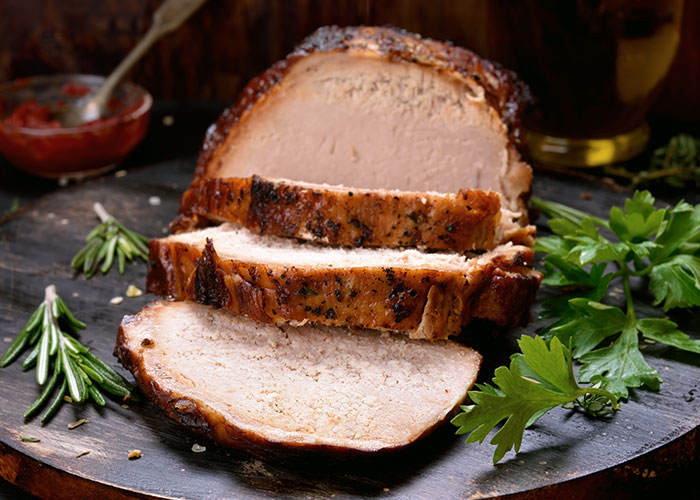
Image credits: theguthealthsolution
The holistic nutritionist and certified personal trainer emphasized the importance of being aware of the products you consume
When it comes to additives in the food industry, Americans are split into two camps. According to Pew Research Center, just over half of them (51%) believe they can harm one’s health over the years. Others say the amount of additives is too small to have a strong negative effect on people’s well-being.
The research center also revealed that there are over 10,000 additives used in food processing, around 3,000 of which the FDA defines as "generally recognized as safe". They are categorized based on types and application. Some examples of the former include preservatives, sweeteners, and food colorants, among others, while the latter comprises such groups as confectionery, bakery products, beverages, and more.
When it comes to global statistics, the leading types of food additives in market size are thickeners and stabilizers. Thickeners, such as starches or gums, are often found in soups and sauces, while stabilizers are common ingredients in mayonnaise, margarine, or even ice cream.
There are international standards that regulate the usage of food additives. However, different countries might have different policies when it comes to some of them. That is why, as Josh mentioned in his video, certain products that are considered fine in the US can be banned in other countries. It is believed that as much as 80% of processed foods sold in the States wouldn’t make it to the shelves in stores abroad due to specific ingredients.
Josh’s video encouraged a lot of people to share their thoughts in the comments
#2
American ground beef is banned by the European Union because of a chemical called Pink Slime that uses ammonia gas for antimicrobial properties and it's dangerous to consume and destroys your gut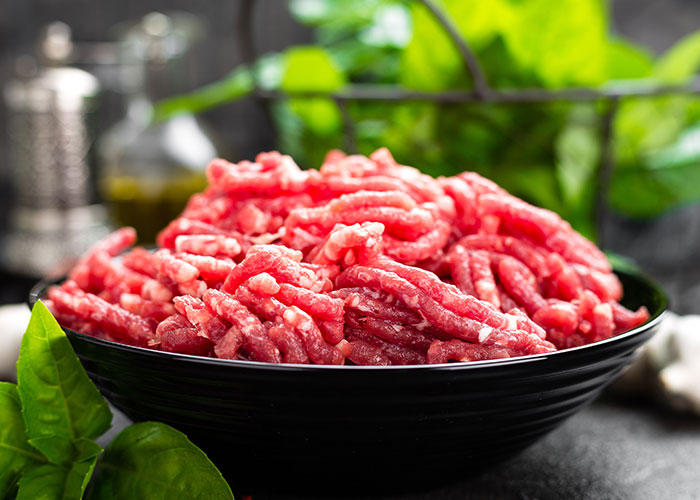
Image credits: theguthealthsolution
The holistic nutritionist and certified personal trainer emphasized the importance of being aware of the products you consume
When it comes to additives in the food industry, Americans are split into two camps. According to Pew Research Center, just over half of them (51%) believe they can harm one’s health over the years. Others say the amount of additives is too small to have a strong negative effect on people’s well-being.
The research center also revealed that there are over 10,000 additives used in food processing, around 3,000 of which the FDA defines as "generally recognized as safe". They are categorized based on types and application. Some examples of the former include preservatives, sweeteners, and food colorants, among others, while the latter comprises such groups as confectionery, bakery products, beverages, and more.
When it comes to global statistics, the leading types of food additives in market size are thickeners and stabilizers. Thickeners, such as starches or gums, are often found in soups and sauces, while stabilizers are common ingredients in mayonnaise, margarine, or even ice cream.
There are international standards that regulate the usage of food additives. However, different countries might have different policies when it comes to some of them. That is why, as Josh mentioned in his video, certain products that are considered fine in the US can be banned in other countries. It is believed that as much as 80% of processed foods sold in the States wouldn’t make it to the shelves in stores abroad due to specific ingredients.
Josh’s video encouraged a lot of people to share their thoughts in the comments
#3
American chicken is banned by the European Union because it's washed in chlorine
Image credits: theguthealthsolution
The holistic nutritionist and certified personal trainer emphasized the importance of being aware of the products you consume
When it comes to additives in the food industry, Americans are split into two camps. According to Pew Research Center, just over half of them (51%) believe they can harm one’s health over the years. Others say the amount of additives is too small to have a strong negative effect on people’s well-being.
The research center also revealed that there are over 10,000 additives used in food processing, around 3,000 of which the FDA defines as "generally recognized as safe". They are categorized based on types and application. Some examples of the former include preservatives, sweeteners, and food colorants, among others, while the latter comprises such groups as confectionery, bakery products, beverages, and more.
When it comes to global statistics, the leading types of food additives in market size are thickeners and stabilizers. Thickeners, such as starches or gums, are often found in soups and sauces, while stabilizers are common ingredients in mayonnaise, margarine, or even ice cream.
There are international standards that regulate the usage of food additives. However, different countries might have different policies when it comes to some of them. That is why, as Josh mentioned in his video, certain products that are considered fine in the US can be banned in other countries. It is believed that as much as 80% of processed foods sold in the States wouldn’t make it to the shelves in stores abroad due to specific ingredients.
Josh’s video encouraged a lot of people to share their thoughts in the comments
#4
Milk is banned due to a synthetic growth hormone called rBGH made by Monsanto that increases cancer risk in humans
Image credits: theguthealthsolution
The holistic nutritionist and certified personal trainer emphasized the importance of being aware of the products you consume
When it comes to additives in the food industry, Americans are split into two camps. According to Pew Research Center, just over half of them (51%) believe they can harm one’s health over the years. Others say the amount of additives is too small to have a strong negative effect on people’s well-being.
The research center also revealed that there are over 10,000 additives used in food processing, around 3,000 of which the FDA defines as "generally recognized as safe". They are categorized based on types and application. Some examples of the former include preservatives, sweeteners, and food colorants, among others, while the latter comprises such groups as confectionery, bakery products, beverages, and more.
When it comes to global statistics, the leading types of food additives in market size are thickeners and stabilizers. Thickeners, such as starches or gums, are often found in soups and sauces, while stabilizers are common ingredients in mayonnaise, margarine, or even ice cream.
There are international standards that regulate the usage of food additives. However, different countries might have different policies when it comes to some of them. That is why, as Josh mentioned in his video, certain products that are considered fine in the US can be banned in other countries. It is believed that as much as 80% of processed foods sold in the States wouldn’t make it to the shelves in stores abroad due to specific ingredients.
Josh’s video encouraged a lot of people to share their thoughts in the comments
#5
Salmon is banned because of chemicals in the feed like methyl mercury, dioxins, and antibiotics
Image credits: theguthealthsolution
The holistic nutritionist and certified personal trainer emphasized the importance of being aware of the products you consume
When it comes to additives in the food industry, Americans are split into two camps. According to Pew Research Center, just over half of them (51%) believe they can harm one’s health over the years. Others say the amount of additives is too small to have a strong negative effect on people’s well-being.
The research center also revealed that there are over 10,000 additives used in food processing, around 3,000 of which the FDA defines as "generally recognized as safe". They are categorized based on types and application. Some examples of the former include preservatives, sweeteners, and food colorants, among others, while the latter comprises such groups as confectionery, bakery products, beverages, and more.
When it comes to global statistics, the leading types of food additives in market size are thickeners and stabilizers. Thickeners, such as starches or gums, are often found in soups and sauces, while stabilizers are common ingredients in mayonnaise, margarine, or even ice cream.
There are international standards that regulate the usage of food additives. However, different countries might have different policies when it comes to some of them. That is why, as Josh mentioned in his video, certain products that are considered fine in the US can be banned in other countries. It is believed that as much as 80% of processed foods sold in the States wouldn’t make it to the shelves in stores abroad due to specific ingredients.
Josh’s video encouraged a lot of people to share their thoughts in the comments
#6
Froot Loops, they're banned because of the soybean oil, sugars, coloring, and cottonseed oil which are considered dangerous in other countries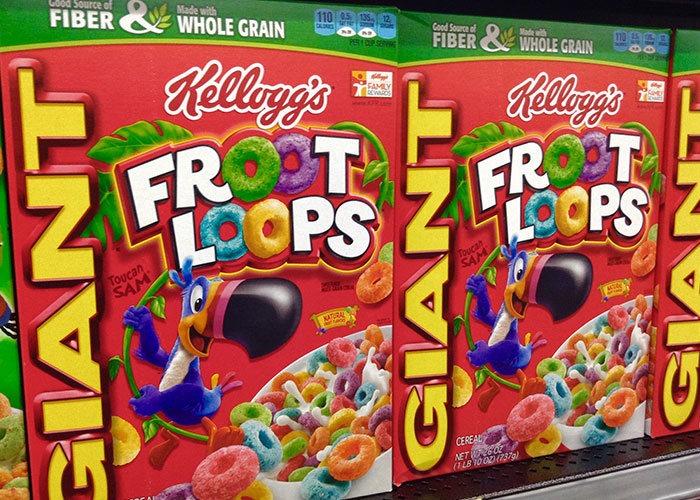
Image credits: theguthealthsolution
The holistic nutritionist and certified personal trainer emphasized the importance of being aware of the products you consume
When it comes to additives in the food industry, Americans are split into two camps. According to Pew Research Center, just over half of them (51%) believe they can harm one’s health over the years. Others say the amount of additives is too small to have a strong negative effect on people’s well-being.
The research center also revealed that there are over 10,000 additives used in food processing, around 3,000 of which the FDA defines as "generally recognized as safe". They are categorized based on types and application. Some examples of the former include preservatives, sweeteners, and food colorants, among others, while the latter comprises such groups as confectionery, bakery products, beverages, and more.
When it comes to global statistics, the leading types of food additives in market size are thickeners and stabilizers. Thickeners, such as starches or gums, are often found in soups and sauces, while stabilizers are common ingredients in mayonnaise, margarine, or even ice cream.
There are international standards that regulate the usage of food additives. However, different countries might have different policies when it comes to some of them. That is why, as Josh mentioned in his video, certain products that are considered fine in the US can be banned in other countries. It is believed that as much as 80% of processed foods sold in the States wouldn’t make it to the shelves in stores abroad due to specific ingredients.
Josh’s video encouraged a lot of people to share their thoughts in the comments
#7
Coffee Mate is also banned due to hydrogenated soybean oil and cottonseed oil which is known to have trans fats, which is bad for your heart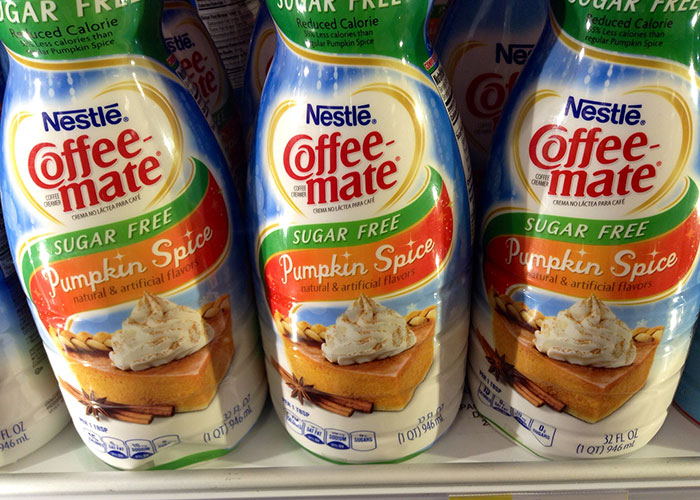
Image credits: theguthealthsolution
The holistic nutritionist and certified personal trainer emphasized the importance of being aware of the products you consume
When it comes to additives in the food industry, Americans are split into two camps. According to Pew Research Center, just over half of them (51%) believe they can harm one’s health over the years. Others say the amount of additives is too small to have a strong negative effect on people’s well-being.
The research center also revealed that there are over 10,000 additives used in food processing, around 3,000 of which the FDA defines as "generally recognized as safe". They are categorized based on types and application. Some examples of the former include preservatives, sweeteners, and food colorants, among others, while the latter comprises such groups as confectionery, bakery products, beverages, and more.
When it comes to global statistics, the leading types of food additives in market size are thickeners and stabilizers. Thickeners, such as starches or gums, are often found in soups and sauces, while stabilizers are common ingredients in mayonnaise, margarine, or even ice cream.
There are international standards that regulate the usage of food additives. However, different countries might have different policies when it comes to some of them. That is why, as Josh mentioned in his video, certain products that are considered fine in the US can be banned in other countries. It is believed that as much as 80% of processed foods sold in the States wouldn’t make it to the shelves in stores abroad due to specific ingredients.
Josh’s video encouraged a lot of people to share their thoughts in the comments
#8
Mountain Dew is also banned due to brominated vegetable oil and bromine is a chemical used in fire retardants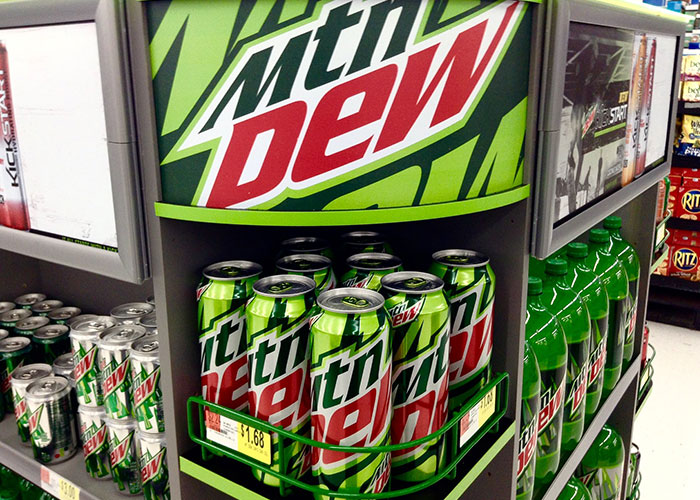
Image credits: theguthealthsolution
The holistic nutritionist and certified personal trainer emphasized the importance of being aware of the products you consume
When it comes to additives in the food industry, Americans are split into two camps. According to Pew Research Center, just over half of them (51%) believe they can harm one’s health over the years. Others say the amount of additives is too small to have a strong negative effect on people’s well-being.
The research center also revealed that there are over 10,000 additives used in food processing, around 3,000 of which the FDA defines as "generally recognized as safe". They are categorized based on types and application. Some examples of the former include preservatives, sweeteners, and food colorants, among others, while the latter comprises such groups as confectionery, bakery products, beverages, and more.
When it comes to global statistics, the leading types of food additives in market size are thickeners and stabilizers. Thickeners, such as starches or gums, are often found in soups and sauces, while stabilizers are common ingredients in mayonnaise, margarine, or even ice cream.
There are international standards that regulate the usage of food additives. However, different countries might have different policies when it comes to some of them. That is why, as Josh mentioned in his video, certain products that are considered fine in the US can be banned in other countries. It is believed that as much as 80% of processed foods sold in the States wouldn’t make it to the shelves in stores abroad due to specific ingredients.
Josh’s video encouraged a lot of people to share their thoughts in the comments
#9
Ritz Crackers are also banned due to high sodium, hydrogenated cottonseed oil, and trans fats, considered very dangerous, highly inflammatory, and carcinogenic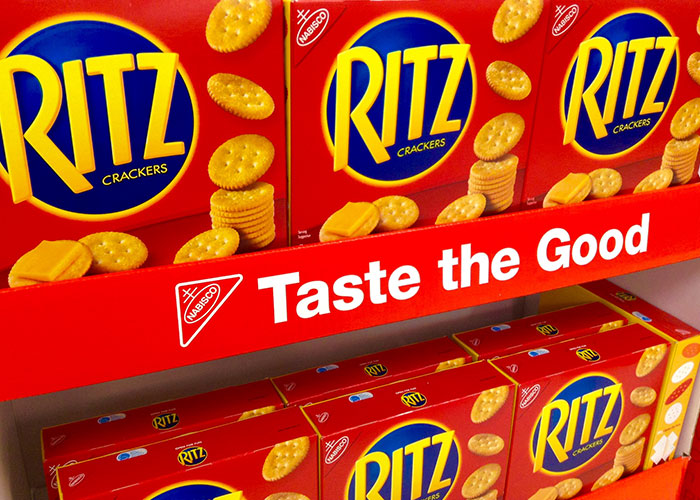
Image credits: theguthealthsolution
The holistic nutritionist and certified personal trainer emphasized the importance of being aware of the products you consume
When it comes to additives in the food industry, Americans are split into two camps. According to Pew Research Center, just over half of them (51%) believe they can harm one’s health over the years. Others say the amount of additives is too small to have a strong negative effect on people’s well-being.
The research center also revealed that there are over 10,000 additives used in food processing, around 3,000 of which the FDA defines as "generally recognized as safe". They are categorized based on types and application. Some examples of the former include preservatives, sweeteners, and food colorants, among others, while the latter comprises such groups as confectionery, bakery products, beverages, and more.
When it comes to global statistics, the leading types of food additives in market size are thickeners and stabilizers. Thickeners, such as starches or gums, are often found in soups and sauces, while stabilizers are common ingredients in mayonnaise, margarine, or even ice cream.
There are international standards that regulate the usage of food additives. However, different countries might have different policies when it comes to some of them. That is why, as Josh mentioned in his video, certain products that are considered fine in the US can be banned in other countries. It is believed that as much as 80% of processed foods sold in the States wouldn’t make it to the shelves in stores abroad due to specific ingredients.
Josh’s video encouraged a lot of people to share their thoughts in the comments
from Bored Panda https://ift.tt/sJePdO8
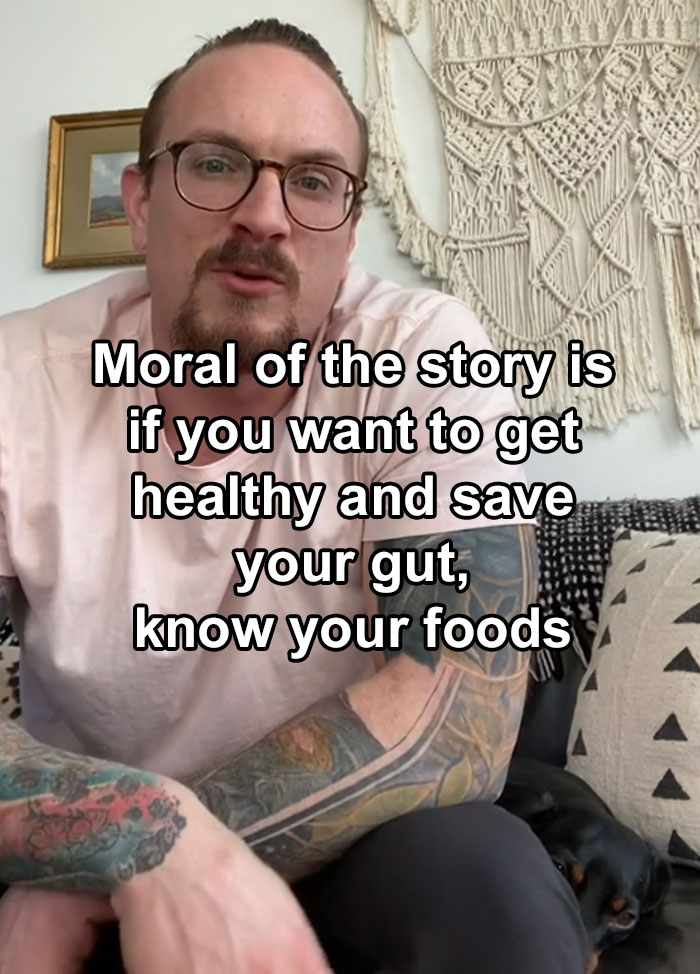

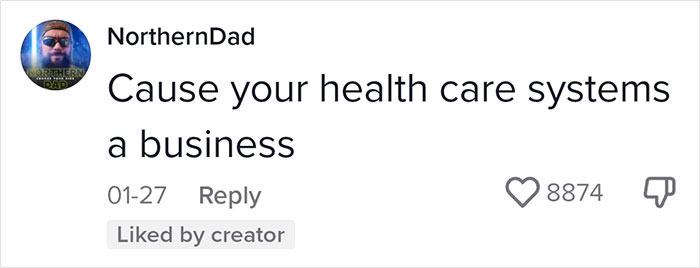
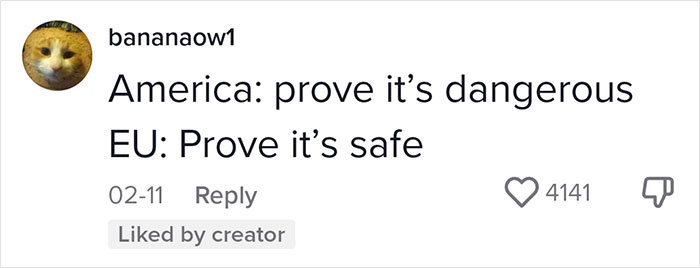
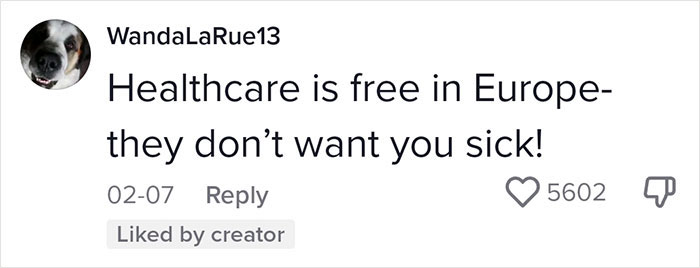
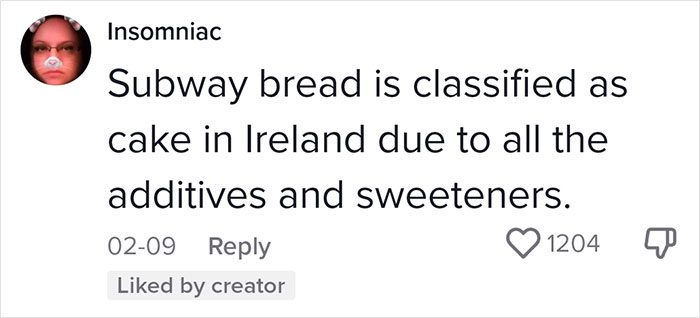
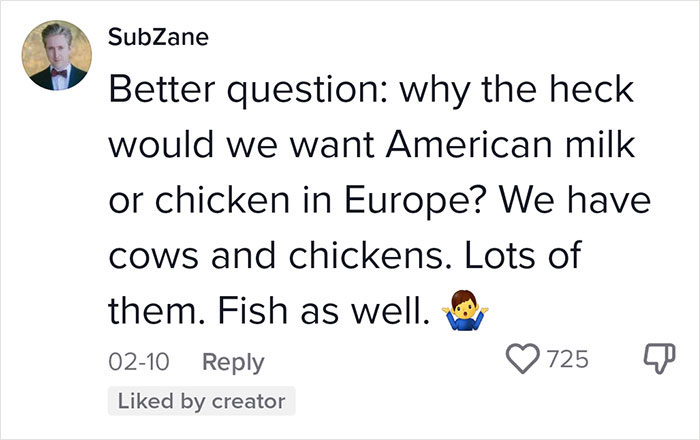
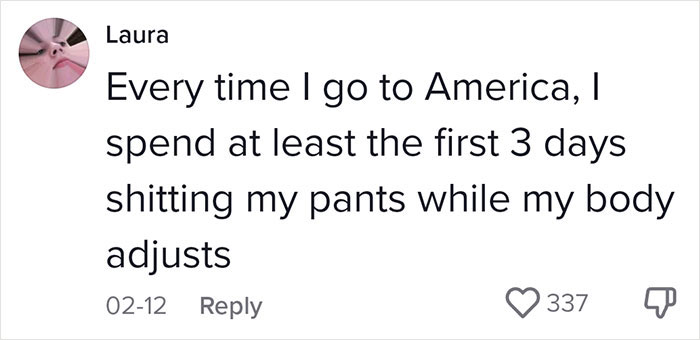

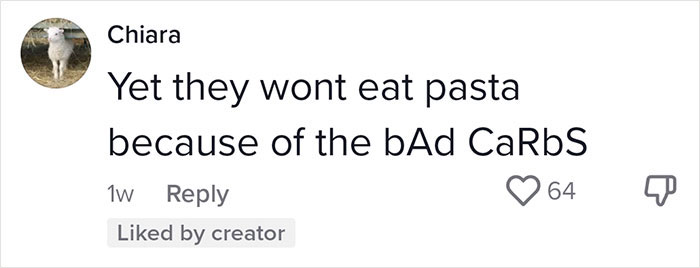
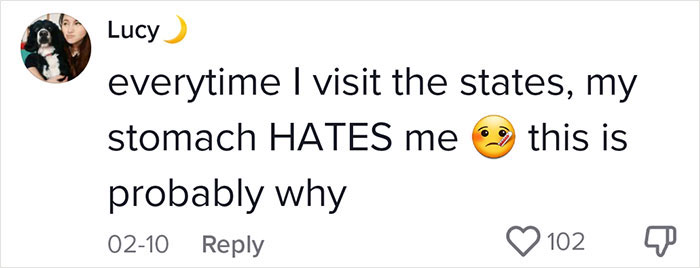

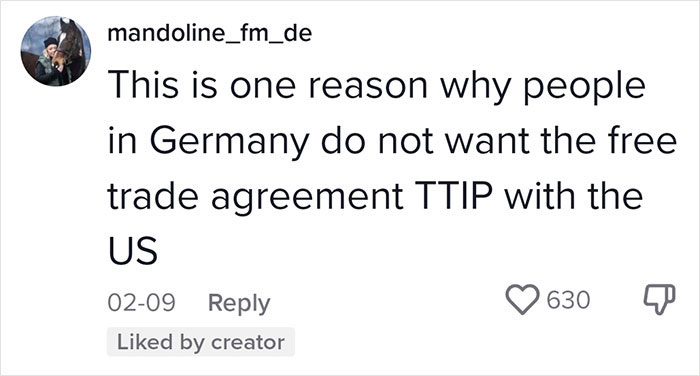
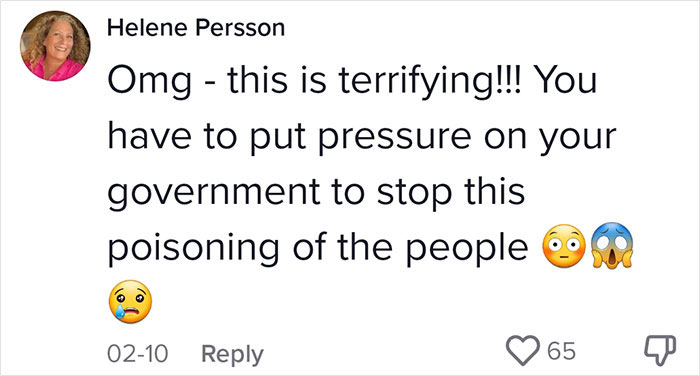
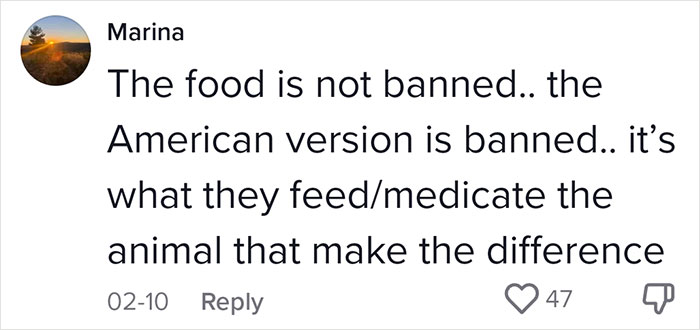
ConversionConversion EmoticonEmoticon